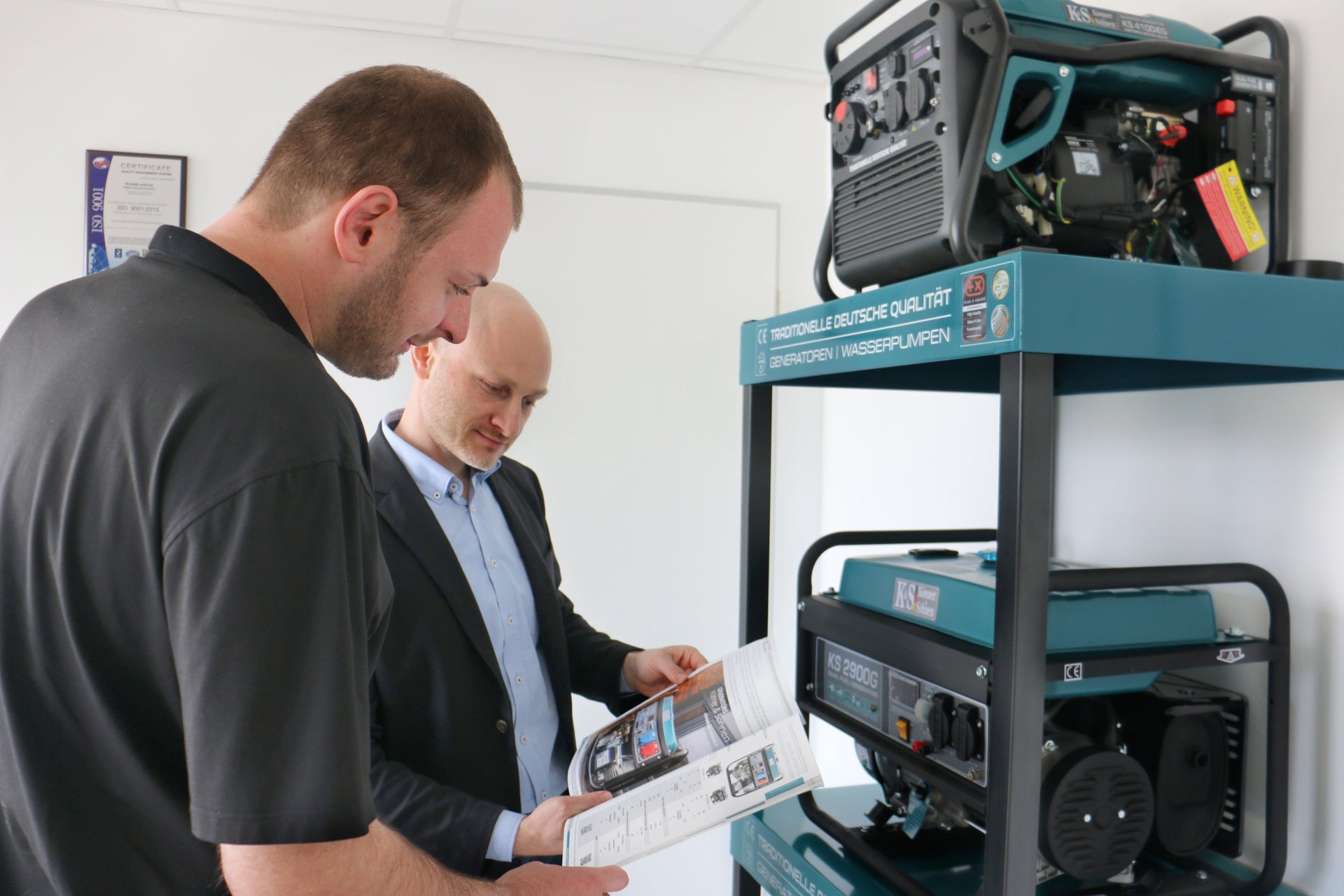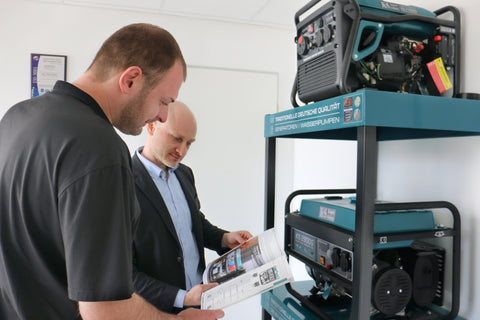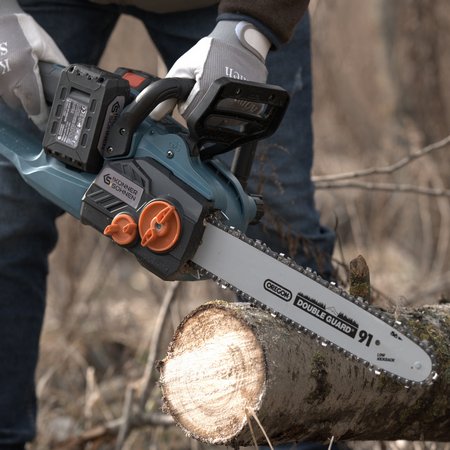- Diesel, petrol or perhaps gas drive? Selecting a generator according to the type of the fuel.
- Inverter generator or conventional generator: which should you choose?
- How do you calculate the power requirement of the generator?
- Tempering type. Which one should I choose?
- Which generator is better: a three-phase or a single-phase generator?
- Air or water cooling
- Synchronous generator or asynchronous generator
- Noise pollution
- Intended use of a power generator: how to choose a power generator for your needs.
- Auswahl eines Generators für ein Solarsystem.
- Support in selecting a generator.
Before buying a generator, you often ask yourself what you need to consider when choosing a generator. Here you can find out which questions you need to answer when choosing the right generator and what you should pay attention to first and foremost.
Diesel, gasoline or perhaps gas drive? Selecting a generator according to the type of fuel.
The engine plays the main role in a generator. The service life of the generator depends on its design and reliability. A diesel or gasoline engine can be considered. Generators with a petrol engine are cheaper, relatively space-saving and produce less noise, although the service life of the petrol engine is shorter than that of the diesel engine. the service life of the gasoline engine is shorter than that of the diesel engine. A petrol engine can also be retrofitted with a retrofitted with a special gas system and can therefore also be operated with liquid gas (propane-butane). Compared compared to a normal petrol generator, this type of LPG/Gasoline Generators more environmentally friendly and economical use thanks to liquid gas operation.
The diesel engine has a significantly longer service life. The main advantages of Diesel Generators gehören Kosteneffizienz und Langlebigkeit. Außerdem ist Dieselkraftstoff billiger und sicherer als Benzin. Auch können sie über längere Zeiträume kontinuierlich betrieben werden als Benzin-Generatoren. Es gibt aber auch einen erheblichen Nachteil: Diesel-Generatoren sind viel teurer alsgehören Kosteneffizienz und Langlebigkeit. Außerdem ist Dieselkraftstoff billiger und sicherer als Benzin. Auch können sie über längere Zeiträume kontinuierlich betrieben werden als Benzin-Generatoren. Es gibt aber auch einen erheblichen Nachteil: Diesel-Generatoren sind viel teurer als Gasoline Generators with the same rated output, even if the price difference pays off over time thanks to the cheaper diesel fuel. It should also be noted that diesel generators have a higher noise level. It is therefore advisable, as far as the budget allows, to choose models with a soundproof housing or to ensure a suitable location for the generator so that you are not disturbed by the noise. Furthermore, a diesel generator takes up more space due to its larger dimensions and greater weight.
Inverter generator or conventional generator: which should you choose?
There are also conventional generators and LPG/gasoline generators. Inverter Generators. The difference between an inverter generator and a conventional generator is that the latter draws voltage directly from the windings, whereas with an inverter generator the voltage is generated electronically and regulated by a built-in inverter module with microprocessor control. This ensures a pure sinusoidal current with a stable frequency of 50 Hz and a voltage of 230 V in the socket. This high-quality current is particularly important for electronics and electronically controlled appliances such as gas boilers and other sensitive appliances. The advantages of Könner & Söhnen inverter generators also include their smaller size and lower weight, as well as the ECONOMY mode, which is available on most models and reduces fuel consumption by up to 50% at low loads.
How do you calculate the power requirement of the generator?
Before you decide on a generating set, you must first calculate the total output of the power consumers that your generating set is to supply with electricity at the same time. When calculating the total output of the power consumers, the starting power of the respective electrical appliance must always be taken into account. This applies in particular to power tools, air conditioning systems, pumps and other devices with an electric motor. For some of these appliances, the starting power can be several times the rated power and must be taken into account. You can determine the starting power (or starting current) of your appliance as follows:
- from the operating instructions or the manufacturer;
- with a special measuring device;
- by determining an approximate value using the following table (to determine the starting power starting power, take the corresponding factor from the table and multiply it by the rated power of your multiply by the rated power of your electrical appliance).

After determining the total power, the power reserve must also be taken into account. The power factor must be taken into account when loading the generator. As this cannot be determined without special measuring equipment and is not always specified by the manufacturers in the technical data, we recommend that the generator is not loaded with more than 70-80% of its rated output. The generator must cover both the active and reactive power of the consumers.
Further information on this topic can be found in the Facebook post and the video “How powerful should a power generator be?”
Tempering type. Which one should I choose?
There are three types of starter:
- Manual start (with a pull-wire starter). To start the generator manually, pull the starter rope quickly and firmly. The manual starter is only used in generators with a low output, as manually starting a generator with an output of over 5 kW requires considerable effort.
- Electric starting. The generator can be started by turning the ignition key on the control panel. The electric starter is suitable for continuous operation, making it considerably easier to use.
- Auto starter with an ATS unit. This type of starter is required if the power generator is used as an emergency power source with automatic starting. In this case, the built-in or external ATS unit (automatic switchover to emergency power) starts the power generator automatically if the main power supply fails and switches it off again when the power supply is restored. Important! Generators with automatic start must be installed in a heated room. At low temperatures (below +5 °C), a generator may be difficult to start and the automatic start function may fail!
An electric starter and an automatic starter ensure greater convenience when using a power generator. So when choosing a powerful generator, make sure that it has an electric starter, as it is difficult to start manually.
Which generator is better: a three-phase or a single-phase generator?
Some buyers believe that three-phase generators are versatile. There is also the opinion that a three-phase generator is the best choice because what is more expensive is better. But that is not the case here. When choosing a single-phase or three-phase generator, it is important to consider which consumers will be connected to it. If only single-phase consumers are to be connected to the generator, then you only need a single-phase generator! Single-phase generators are ideal for holiday homes, as all the electrical household appliances used there (TVs, refrigerators, microwave ovens, kettles) are single-phase consumers. It should be noted that consumers such as an electric stove, a powerful water heater, an air heater, an electric boiler or a sauna are only connected to the normal three-phase network in the house for load distribution and are basically a series of single-phase heating elements, which must therefore be supplied by a 230V generator.
Three-phase generators should only be used to supply three-phase consumers that require a rotating field or other consumers that load all three phases of the generator symmetrically. These include, for example, motors or pumps that require only three-phase current (400 V). Heat pumps normally use mixed internal power consumers, whose supply via a three-phase generator is fundamentally unreliable.
To ensure that powerful 400V consumers (especially those with phase control) do not damage sensitive 230V consumers, we generally recommend separate supplies for single-phase (230 V) and three-phase (400 V) consumers in the household.
However, if you need a universally applicable generator that is suitable for both single-phase and three-phase consumers, Könner & Söhnen models with the code number "1/3" in the name (KS 7000E 1/3, KS 10000E 1/3, etc.) are a good choice. They are equipped with a VTS function for switching between single-phase and three-phase operation.
Air cooling or water cooling
In air-cooled generators, cooling occurs through normal heat exchange between the engine surfaces and the ambient air. These generators have engines with a speed of around 3000 rpm.
Water-cooled generators are more powerful. They are equipped exclusively with a diesel engine, which has a significantly longer service life. These generators can also be operated continuously for much longer than conventional generators. Due to their high weight, these generators are used as a permanently installed, independent power source in country houses or business premises.
Synchronous or asynchronous generator
Before you decide on a generator, you should consider which devices you want to power with it.
With asynchronous generators, it is not possible to maintain a stable voltage and frequency when switching powerful consumers on and off. However, they can easily withstand short-term short circuits and have a wide output current range. These properties are particularly advantageous when operating certain devices (e.g. welding machines). Asynchronous generators are also used in power generation plants.
Synchronous generators produce a more stable voltage and can withstand the starting currents of household appliances with electric motors. These generators are great for emergency power supply of private homes, offices, summer cottages, refrigeration plants and construction sites. Although they can withstand short-term overloads, they should be protected from dirt and water. A synchronous generator, whose power is less than that of an asynchronous generator, is sufficient for operating electronic household appliances and construction tools.
Asynchronous generators are only used for specific tasks, so most household generators are synchronous generators. We therefore recommend that you choose these generators for your home use as well. All conventional (conventional, without inverter technology) generators from Könner & Söhnen are synchronous generators.
Noise pollution
The noise level of the generator should be taken into account when choosing a location. Diesel generators usually produce more noise than gasoline models. In addition, inverter generators have an ECONOMY mode that, when activated, reduces the engine speed and noise level.
The generators of the brand "Könner & Söhnen" meet all European standards, including those related to the noise level. For convenience, the generators should be installed in a place away from people. You can also place the generator in a special container to reduce noise, which has a foundation, ventilation and a system for exhaust gas extraction. However, it is easier and more economical to choose a diesel or inverter generator with a factory soundproof housing.
Intended use of a power generator: how to choose a power generator for your needs.
If you are looking for a power generator for the campsite, then a lightweight and space-saving inverter generator (up to 2 kW) with a low noise level is the right choice.
For your holiday home, where you spend most of the summer or which you are renovating (extensions), a petrol generator with a power of up to 5 kW is sufficient.
For a country house, a petrol or diesel generator with air cooling is best as an alternative emergency power source (in case of a power outage).
If your country house or business premises need long-term electricity supply, you will need a powerful Diesel power plants mit with water cooling (up to 30 kVA).
Watch our video on the topic “Who are Könner & Söhnen generators suitable for? Top 10 application scenarios”.
Selection of a generator for a solar system.
Various types of generators are used to ensure an uninterrupted power supply to the solar system in times of shortages or emergencies. Diesel generators are particularly suitable for large solar systems due to their performance, high reliability and long service life. For household solar systems, however, conventional or inverter-controlled petrol generators are the right choice. However, if a generator is required for a domestic solar station with 48V batteries, the DC Generator KS 48V-DC from Könner & Söhnen is the optimal solution. This generator has many advantages and is specially designed for this application.
Support in selecting a generator.
Now you know what to look for when choosing a generator. As the article shows, there are not so many aspects to consider when choosing the right generator. However, you should be careful when choosing one, because the wrong generator will not only be unsuitable for its intended purpose, but can also damage the devices connected to it. Therefore, we always recommend getting help from a salesperson when buying a generator.
If you still have questions about generators or doubt whether our generator is suitable for your tasks, contact our support team. On the Contacts page you will find phone numbers and email addresses that will help you choose the right generator.
We wish you a successful purchase!








